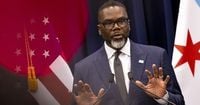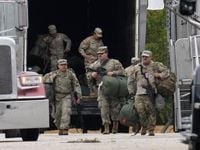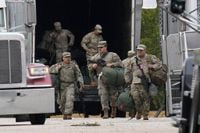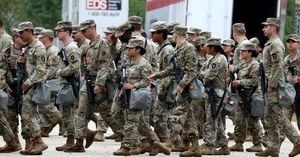National Guard troops from Texas began arriving in Illinois this week, marking a dramatic escalation in President Donald Trump’s campaign to deploy military resources to major U.S. cities—a move that’s ignited fierce legal and political battles across the country. The deployment, which targets Chicago in particular, comes despite vocal opposition from Illinois Governor JB Pritzker, Chicago Mayor Brandon Johnson, and a string of ongoing lawsuits challenging the legality of federal intervention.
Trump’s push to send the National Guard into Chicago is the latest in a series of efforts to crack down on what he describes as out-of-control crime and to bolster immigration enforcement in Democratic-led cities. According to The Daily Signal, the president took to Truth Social on Wednesday, October 8, 2025, writing, “Chicago Mayor should be in jail for failing to protect ICE Officers!” He didn’t stop there, adding, “Governor Pritzker also!” The president’s remarks were the latest in a string of public condemnations, as he accused Illinois’ Democratic leaders of letting crime run rampant and failing to cooperate with federal immigration authorities.
Mayor Johnson, for his part, has taken concrete steps to resist federal involvement. Earlier this week, he signed an executive order establishing “ICE Free Zones,” which ban Immigration and Customs Enforcement agents from city property. The move was meant to shield undocumented residents from federal raids and signal the city’s opposition to Trump’s immigration crackdown. In tandem, Illinois and Chicago filed a lawsuit on Monday, October 6, to block the deployment of National Guard troops, arguing that the federal government was overstepping its bounds and inflaming local tensions.
The arrival of Texas National Guard troops at a U.S. Army Reserve Center near Chicago on Tuesday, October 7, was met with immediate backlash from local officials. As reported by Al Jazeera, Governor Pritzker accused Trump of “using our service members as political props and as pawns in his illegal effort to militarize our nation’s cities.” Mayor Johnson called the president’s strategy “unconstitutional, it’s illegal and it’s dangerous.” Both leaders have insisted that military intervention is unnecessary and only serves to escalate the situation.
Despite these objections, a federal judge on Tuesday allowed the deployment to proceed for the time being, ordering the U.S. government to file a formal response to the lawsuit by Wednesday, October 8. The legal fight is far from over, but for now, the National Guard presence in Illinois is a reality.
Trump’s justification for the deployment hinges on his portrayal of Chicago as a city in crisis. He has repeatedly described it as a “hellhole” and, on Tuesday, claimed there were likely “50 murders in Chicago over the last 5, 6, 7 months.” Yet, government data cited by Al Jazeera and the BBC tells a more nuanced story: Chicago saw a 33 percent reduction in homicides and a 38 percent reduction in shootings in the first six months of 2025. Still, the city has held the grim distinction of the highest number of murders among U.S. cities for thirteen consecutive years and the highest murder rate among cities with over a million residents for seven years straight.
This isn’t the first time Trump has sought to deploy the National Guard to Democratic strongholds. Over the past year, he has sent troops to Los Angeles, Washington, D.C., and Portland, Oregon, often over the objections of local and state leaders. In each case, the administration has cited violent protests, crime, or immigration enforcement as justification. But federal judges have not always sided with the White House. In September, a judge found that the administration “willfully” broke federal law by deploying Guard troops in Los Angeles during protests over immigration raids, ruling that the action violated the Posse Comitatus Act—which restricts the use of federal military forces for domestic law enforcement.
The legal wrangling over Trump’s authority centers on the Insurrection Act, an 1807 law that allows the president to deploy the military or federalize the National Guard in cases of insurrection or rebellion. Speaking to reporters in the Oval Office on Monday, Trump declared, “We have an Insurrection Act for a reason. If I had to enact it, I’d do that.” The administration’s willingness to invoke this rarely used law has alarmed constitutional scholars and political opponents alike.
Bruce Fein, a constitutional lawyer quoted by Al Jazeera, explained that presidential powers under the act are intended only for major rebellions, akin to the U.S. Civil War, where ordinary law enforcement and courts can’t function. He noted, “Congress, however, could impeach and remove Trump for misuse of the act in Portland,” and added that military personnel are obligated to disobey orders that are clearly unlawful. Fein asserted that Trump’s use of the act in Portland would be “clearly illegal” even if it cannot be challenged in court.
As the legal and political drama unfolds, the Trump administration remains unwavering in its stance. White House press secretary Karoline Leavitt told reporters on October 6, “We’re very confident in the president’s legal authority to do this. And we’re very confident we will win on the merits of the law.” The administration has already appealed rulings that temporarily blocked deployments in Oregon and California, and it shows no sign of backing down.
Democratic governors and city leaders, meanwhile, are digging in for a protracted fight. Illinois Governor Pritzker insists Trump is “manufacturing a crisis,” while Oregon Governor Tina Kotek has repeatedly stated, “There is no insurrection in Portland, no threat to national security.” Federal judges have, at times, sided with the states: On October 5, Judge Karin Immergut blocked Trump from federalizing the Oregon National Guard and issued a temporary restraining order against deploying California’s Guard to Portland. “This is a nation of constitutional law, not martial law,” she wrote in her ruling.
The stakes are high, both legally and politically. The outcome of these court battles could set significant precedents for the limits of presidential power, the role of the military in domestic affairs, and the relationship between federal and state governments. For Chicago residents, the sight of out-of-state troops in their city is a stark reminder of the broader national struggle over law, order, and the boundaries of executive authority.
As the legal clock ticks and the troops remain on standby, all eyes are on the courts—and on the streets of Chicago—to see how this unprecedented confrontation between federal power and local autonomy will play out.






